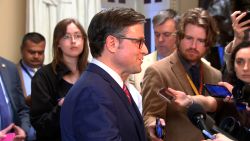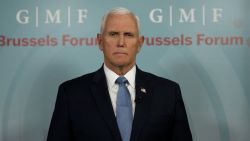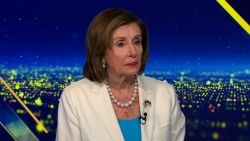Joe Biden’s struggle to make America normal again after the pandemic is proving to be far more protracted and complicated than first thought, which has enormous political implications for the President and his party.
An admission by Transportation Secretary Pete Buttigieg on CNN Sunday that supply chain backups, which are having a corrosive impact on the wider economy, will linger into next year further underscored a tough midterm election environment for Democrats. There is only limited action Biden can take to get containers stacked up at ports out into the country, meaning the situation is causing a real headache for the White House.
When Americans head into stores and see bacon has doubled in price, or when they cannot buy the gifts they want heading into the holiday season, Biden and Democrats are likely to get the blame in next month’s elections and in 2022. The cost of living – along with gasoline that is now averaging $3.32 a gallon nationwide, according to the American Automobile Association – provides an opening for Republicans to argue that the Biden presidency is a failure. Rising discontent also fits neatly into the narrative of decay and national humiliation that Donald Trump is painting as he prepares the ground for a likely presidential campaign for 2024. On Sunday, for instance, the ex-President sent out a fundraising email that noted “prices soaring.”
First-term presidents almost always suffer congressional election rebukes, as their actions often energize the opposing party’s supporters against them and any struggles they have can cause their own voters to disengage. This time, with Democrats only possessing the narrowest of majorities in the House and the Senate, they badly need the economy to be racing ahead and the curse of the pandemic to be well behind the country in a year’s time. But a catalog of problems, including a strapped labor market, rising energy prices, climbing inflation, political polarization over vaccines and an immigration crisis at the southern border, are creating a disgruntled national pre-election year mood.
Biden White House
Covid-19 deaths and hospitalizations are forecast to keep declining over the next several weeks, but the Delta variant and Biden’s own premature declaration of partial victory over the pandemic on July Fourth have also meant that any assumptions about being back to normal by late this year have already been shattered.
The President sought to offer some light at the end of the tunnel last week, but was careful to point out that Covid-19 was far from going away. He cited “important progress” but added, “Now’s not the time to let up. We have a lot more to do. We’re in a very critical period as we work to turn the corner on Covid-19.”
His assurances are important because a CNN/SSRS poll released last month found that 69% of Americans thought things in the country were going badly. Surveys have also found that satisfaction with Biden, as he struggles to bridge Democratic divides on Capitol Hill and pass his agenda, has declined, though his approval rating did hit 50% in a CNN poll last week.
Biden’s election was in many ways a reaction to the chaos of Trump’s failure to properly manage the pandemic. In fact, the President said so himself in a news conference in March of this year.
“When I took office, I decided that – it was a fairly basic, simple proposition – and that is I got elected to solve problems,” Biden said. “And the most urgent problem facing the American people, I stated from the outset, was Covid-19 and the economic dislocation for millions and millions of Americans.”
By his own benchmark then, and partly due to factors beyond his control, Biden has fallen short. And his diminished approval ratings appear to reflect his own judgment that beating the pandemic was the way he would be judged by voters. If the President cannot argue to Americans next year that he did what he was hired to do, then the traditional gains for the party out of power of the White House could translate into major Democratic losses in Congress.
Buttigieg: Challenges to continue into next year
During the 2020 campaign, Biden’s performance was notable for his command of the scale of the Covid-19 crisis, relentlessly on-message public appearances and an almost Fireside Chat-style in which he came across as taking Americans into his confidence and building their trust. As President, and as the pandemic has dragged on longer than Biden and everyone else expected, he has been less surefooted and his message has lacked the same resonance. The chaotic withdrawal from Afghanistan and Biden’s terse public response, meanwhile, supported the views of critics who concluded his presidency was being overtaken by events.
There are some promising signs on the pandemic. Daily new Covid cases are about half the level of the summer surge and are trending down in almost every state. Deaths are also beginning to decline. It’s likely that economic activity and job creation could spike once the virus ebbs across the country.
But the sense of disrupted normality endures. Many parents of young kids are desperate for regulators to authorize vaccines for children under 12. Another Thanksgiving stands to be disrupted for many families since it’s unlikely even if the shots are authorized soon, that millions of kids will get them and be fully vaccinated by the end of next month. It’s also becoming clear that many of the serious global consequences of the pandemic, which will weigh on American life, will not simply disappear in the coming months.
On that score, Buttigieg’s comment on CNN’s “State of the Union” is the latest sign that a post-pandemic economic surge that could help mask other issues and persuade voters to stick to Biden’s course is far from certain.
“Certainly a lot of the challenges that we’ve been experiencing this year will continue into next year, but there are both short-term and long-term steps that we can take to do something about it,” Buttigieg told Jake Tapper.
Buttigieg spoke after Moody’s Analytics warned last week that supply chain disruptions “will get worse before they get better.”
The supply chain crunch has plentiful causes, is deeply complex and influenced by many factors that the President cannot control – including Covid outbreaks in exporter countries and the fact that most of the US port, haulage and retail industries are run by private firms Biden cannot simply order to do better.
Piles of containers backing up at US ports and ships idling offshore waiting to offload are being exacerbated by a post-pandemic shortfall in truckers, meaning this is a problem that is not easy to solve quickly. And the supply chain crunch is causing demand to increase, which in turn causes inflation to rise, which makes the cost of living more expensive and increases pressure on voters’ wallets.
Rising demand fuels inflation
Buttigieg, a rising Democratic political star who might have expected the Transportation Department to offer a comparatively safe political landing spot, now finds himself in the middle of a dicey political crisis.
He actually portrayed the crisis – at least the issue of high consumer demand – as a sign of success for the President.
“Every one of those ships is full of record amounts of goods that Americans are buying, because demand is up, because income is up, because the President has successfully guided this economy out of the teeth of a terrifying recession,” Buttigieg said on “State of the Union.”
The transportation secretary’s appearances on several Sunday talk shows – and a move last week by the President to convene port bosses and unions that led to the introduction of 24/7 operations at the port of Los Angeles – proves that the White House is acutely aware of the damaging political impact of the supply chain issue and its consequences for regular Americans after a grueling year.
Buttigieg also argued that passing Biden’s stalled bipartisan infrastructure package, which is being held up by progressives as leverage in their fight for Biden’s social spending plan, would help ease the situation.
“There are $17 billion in the President’s infrastructure plan for ports alone,” Buttigieg told Tapper. He billed the other leg of Biden’s agenda as a critical component of firing up the Covid-slowed economy.
“If you care about inflation, you ought to care about not just the supply chain issues, not just the infrastructure things I work on,” he said, going on to highlight features of Biden’s “Build Back Better” agenda “like paid family leave, like making it easier to afford child care, like community college that are going to give us a stronger labor force and help us deal with that major constraint on economic growth.”
While many of the problems hampering Biden’s presidency do seem intractable, Democrats can at least hope that things will improve by next year. If the US is finally in the endgame of the pandemic, global energy prices ebb, and the supply chain crunch eases as the rest of the world comes closer to beating Covid, voters may feel in a better frame of mind as the midterm elections approach.
But for now, it’s a tough economic picture.


















